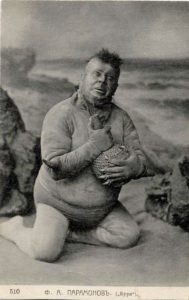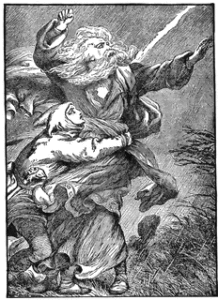 The other day I saw a discussion about how you think a modern Hamlet’s ghost should be staged. My first thought was, “I was the ghost popping up randomly, in the audience, in a way that makes them think it’s impossible for that to be happening.”
The other day I saw a discussion about how you think a modern Hamlet’s ghost should be staged. My first thought was, “I was the ghost popping up randomly, in the audience, in a way that makes them think it’s impossible for that to be happening.”
My first thought was, “Hologram?” But I put that off as too expensive, but also because the evidence about what was to happen (such as a mini pedestal/stage where he’d appear) would ruin the effect.
Then I thought, “Just have multiple actors dressed as the ghost, so when one exits, another one can appear elsewhere.” But if they don’t look identical, the effect isn’t the same.
Twins! Comedy of Errors had twins. Ok, fine, maybe Shakespeare didn’t actually have twins to work with (did he?) I know that I’ve yet to see a Comedy of Errors with actual twins.
But that brings me to our question. What if you did have twins in your group? How would you use them? On the drive in to work today I was thinking about the difference between doubling an actor (Theseus / Oberon anybody?) versus how you’d do it with twins. If you never have them on stage at the same time there’s no point, so how would you change the staging to take advantage?
How about two Hamlets? One that devolves slowly into madness (complete with costume change), while the other remains his normal self, silently watching the proceedings. Until at some crucial point late in the play the good Hamlet disappears. (I saw a high school production once with five Hamlets, all on stage at once, all delivering the lines. It was weird.)
King Lear where Goneril and Regan are twins? Not sure how much that really changes the story, but it strengthens the bond between them versus Cordelia, and later shows how big a deal it is when they split.
A Tempest where Ariel and Caliban are twins? I saw a production once where they were handled like conjoined twins, and at the end Prospero separated them.
I’m clearly no director, but I know many of you are. What better ideas can you come up with? Assume that you can have access to a set of twins of whatever type you need, young or old, male or female.



 A coworker challenged me to participate in NaNoWriMo, the National Novel Writer’s Month. If you’re not familiar, this contest challenges writers to create a complete fifty thousand word novel in just thirty days. Technically November is past, but there’s no reason why you can’t attempt the challenge any month you like.
A coworker challenged me to participate in NaNoWriMo, the National Novel Writer’s Month. If you’re not familiar, this contest challenges writers to create a complete fifty thousand word novel in just thirty days. Technically November is past, but there’s no reason why you can’t attempt the challenge any month you like.